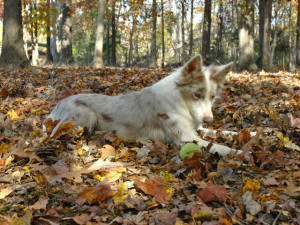
With the arrival of cooler weather, your dog may spend more time outside playing. His skin, mouth, nose and eyes could come in contact with chemicals you use in the yard, so make sure the products are dissolved and inert before allowing your pet in the yard. Or better yet why not switch to less toxic products?
Organic gardening is an excellent idea for a family with a pet. Purdue University researchers have discovered that gardens and lawns treated with herbicide increase your dog’s risk of bladder cancer in Scottish terriers by at least four times, as seen in Modern Dog Magazine.
Mulch can be dangerous for dogs, especially if it is one of the varieties made with chocolate. Cocoa bean mulch is made from the shells of cocoa beans, and it can be toxic to your dog. Its sweet smell attracts dogs, but it’s as dangerous as chocolate if ingested.
The ASPCA states that the ingestion of larger amounts of cocoa bean mulch may cause various clinical signs, including diarrhea, vomiting and an elevated heart rate. If your dog consumes larger amounts, he may develop muscle tremors, hyperactivity and other serious neurological signs.
Dog-Proof your Garage
Your garage contains many chemicals that can be dangerous for your dog. Some are corrosive, others are flammable and most are very toxic. Antifreeze, unless it is one of the new pet-friendly formulas, is quite dangerous, since it smells and tastes sweet. Poisoning with antifreeze is one of the most commonly occurring dog poisons. Store antifreeze on secure, high shelves with doors that lock.
If you believe your dog has swallowed antifreeze, call your vet and poison control right away. Do not induce vomiting unless you are instructed to do so. Sometimes these chemicals cause even more damage if they are thrown up.
Petroleum products cause severe reactions in dogs. They include solvents like paint thinner, gas or diesel fuels, waxes, motor oil, paints and pesticides. Be careful to clean up anything that leaks on your garage floor from your car or DIY projects. Even inhaling some of these products can be toxic for your dog.
Do not induce vomiting if your dog inhales or ingests petroleum products. Pet Health Network states the same thing that veterinarians do: Take your dog to the vet straight away. Store all petroleum products in cabinets that can be closed and locked, so that your dog cannot get to them.
Battery acid is also dangerous. Your pet may step in it and then lick his paws. This is another instance where you don’t want to induce vomiting; just get your dog to a vet.
As a Richmond dog owner, store all lawn, vehicle and DIY chemicals locked away, where your pet can’t get to them.
